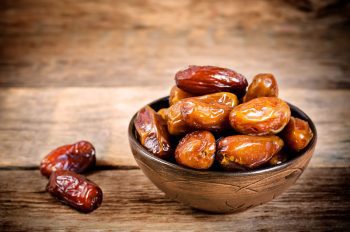The Health Benefits of Dates

July 9th, 2018
By Sayer Ji
Contributing writer for Wake Up World
Eating Dates Produces Powerful Health Benefits, Religion and Science Agree

July 9th, 2018
By Sayer Ji
Contributing writer for Wake Up World
Since biblical times, dates
were to believed to possess profound healing properties, but only now is
science catching up to confirm our distant ancestors knew exactly what
they were talking about.
If you go by the Nutrition Facts panel
of an ordinary package of dates, they look more like sugar bombs than a
healthy snack. Check this one out:
But are they really as nutritionally vapid as these label claims make them seem? Not by a long shot.
When we apply the
complementary lenses of modern scientific investigation and ancient
wisdom, dates begin to look like both a holy-food and a super-food of
immense value. Here’s a neat example.
From the Koran to Clinical Trials: Dates for Better Birthing
In the Koran, the central holy book of
Islam, Allah instructs the Virgin Mary to consume dates when she gives
birth to Jesus.[1] And so, not surprisingly, dates are commonly referred
to within the Islamic tradition as beneficial to pregnant women. We
might chalk this up as “pre-scientific” magical thinking without basis
in medical fact, were it not for a remarkable human clinical study that
confirmed their value in pregnancy…
Published in the Journal of Obstetrics and Gynecology in 2011, and titled “The effect of late pregnancy consumption of date fruit on labour and delivery“,
researchers set out to investigate the effect of date fruit consumption
on labor parameters and birth outcomes. Over the course of 11 months at
Jordan University of Science and Technology, two groups of women were
enrolled in a prospective study where 69 women consumed six date fruits
per day for 4 weeks prior to their estimated date of delivery, versus 45
women who consumed none. These women were matched so there was no
significant difference in gestational age, age and parity (the number of
times a woman has brought a pregnancy to viable gestational age)
between the two groups.
The results of the date intervention were reported as follows:
- Improved Cervical Dilation: “The women who consumed date fruit had significantly higher mean cervical dilatation upon admission compared with the non-date fruit consumers (3.52 cm vs 2.02 cm, p < 0.0005).”
- Less Damage to Membranes: “[The intervention group had] a significantly higher proportion of intact membranes (83% vs 60%, p = 0.007).”
- More Natural (Spontaneous) Labor: “Spontaneous labour occurred in 96% of those who consumed dates, compared with 79% women in the non-date fruit consumers (p = 0.024).”
- Less Drugs Required: “Use of prostin/oxytocin was significantly lower in women who consumed dates (28%), compared with the non-date fruit consumers (47%) (p = 0.036).”
- Shorter Labor: “The mean latent phase of the first stage of labour was shorter in women who consumed date fruit compared with the non-date fruit consumers (510 min vs 906 min, p = 0.044).”
“It is concluded that the consumption of date fruit in the last 4 weeks before labour significantly reduced the need for induction and augmentation of labour, and produced a more favourable, but non-significant*, delivery outcome. The results warrant a randomised controlled trial.” [2]
Thanks to research like this we can see
how the mythological and scientific ways of understanding now converge
and confirm one another. I believe that rather than contradict and/or
negate one another, the mythos and logos
are beginning to assume a far more productive complementary
relationship as we move into a new era of understanding where the
profane and sacred are perceived as intimately entwined in our direct
experience. The field of nutrition, as you can see, is no exception.
No comments:
Post a Comment